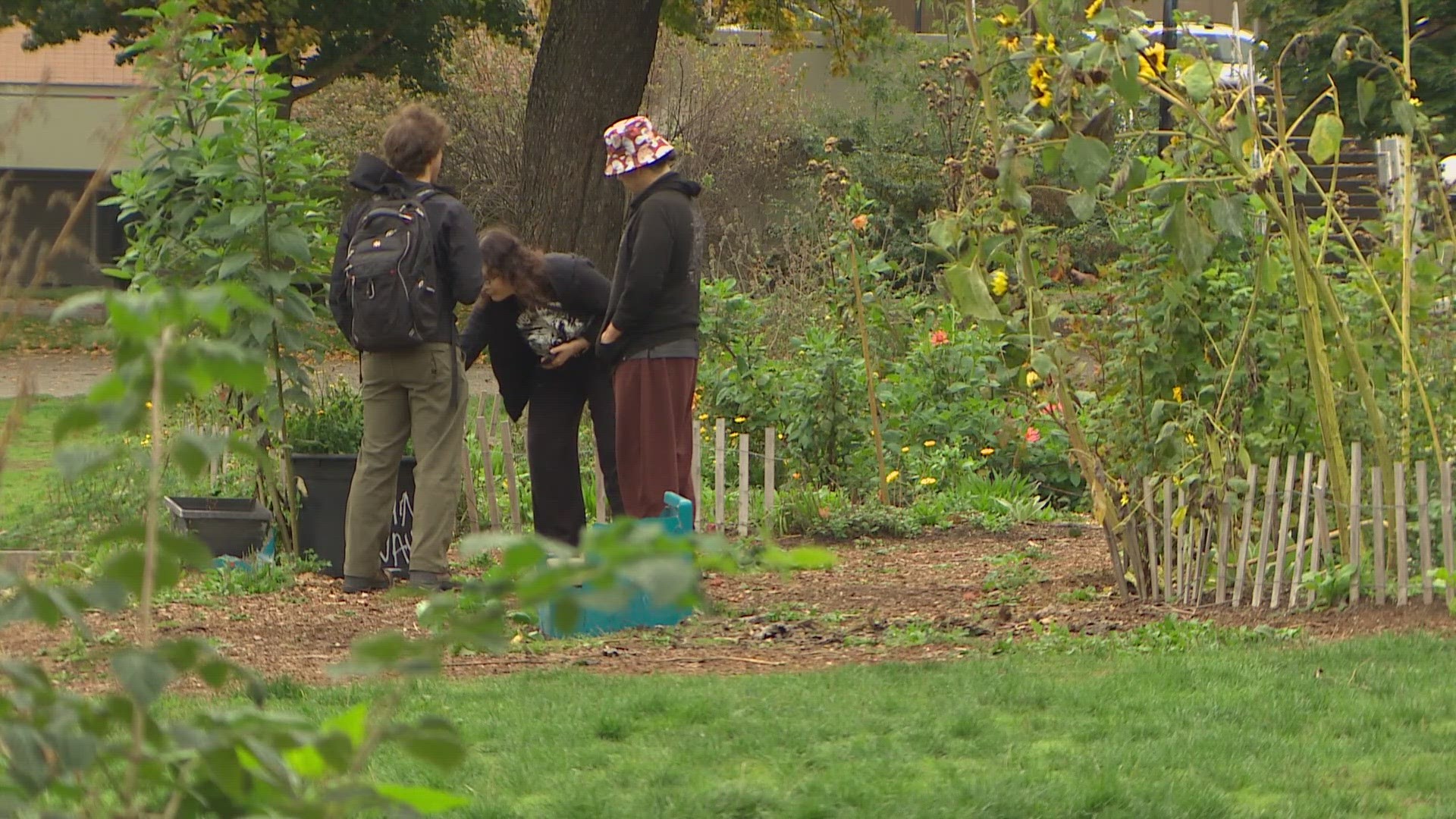SEATTLE — Seattle Parks and Recreation (SPR) is planning to remove a community garden that became a symbol of hope during the 2020 protests following the murder of George Floyd.
The garden, located in Cal Anderson Park on Seattle’s Capitol Hill, was created by volunteers inside the Capitol Hill Organized Protest (CHOP). Since then, the garden has inspired several other urban farms across Seattle and contributed to a Black and Indigenous food sovereignty movement in the region.
Now the city wants it gone. A City of Seattle sign near the garden says the area will soon undergo “turf renovation” and that “natural grass” will replace the space that is currently growing food such as corn and collard greens as well as medicinal herbs and native plants.
In a statement to KING 5, an SPR spokesperson said the change is necessary so the space can be used “to support larger community uses.”
“The (area) remains one of the few spaces that is appropriate to host gatherings and large events at Cal Anderson Park because of its intentional design as a natural amphitheater and proximity to electrical and water hook-ups,” wrote SPR Public Affairs Manager Rachel Schulkin.
The nonprofit Black Star Farmers emerged as a result of the Black Lives Memorial Garden (BLMG). The organization continues to steward the space today. On its website and in literature spread throughout the neighborhood, they vow to work to save the garden.
“This is our collective space. We must organize and act accordingly,” reads a headline on its website. “Now is the time to show up and get organized.”
The website also outlines the garden’s contributions beyond growing produce and herbal medicine free of charge to the community. Black Star Farmers characterizes the space as a place dedicated to empowering oppressed populations.
“The garden has expanded beyond its symbolic representation of resistance against imperialist state oppression to become an active community hub for mutual aid networks, food distribution, and political education for building dual power and unity amongst oppressed communities.”
Schulkin, the SPR spokesperson, said the city has tried to negotiate with Black Star Farmers, including offering to help move the plants to another city-owned space behind the Rainier Community Center.
“After several non-responsive offers to relocate the garden, SPR formally contacted Black Star Farmers directly on Oct. 5 to give notice that the garden will be removed,” Schulkin wrote. “Please know SPR respects the intent and the symbolic meaning of the BLM garden and that should Black Star Farmers be interested in creating a garden within the Seattle Park system, we are supportive and willing to help them in finding an appropriate location.”
The Black Star Farmers website said moving the garden to another location isn’t acceptable, as it is part of what’s known as an occupation protest.
Seattle has a rich history of occupation protests leading to disenfranchised communities securing permanent spaces. In 1970, 100 protesters occupied the former Fort Lawton, demanding the land be given back to native people. Seven years later, Daybreak Star Indian Cultural Center was created. El Centro de la Raza, a nonprofit hub for the region’s Hispanic community, exists because of an occupation protest of an abandoned school on Seattle’s Beacon Hill in 1972.
“We explained (to the city) that because the BLMG is connected to a legacy of occupation protests, led by Black and Indigenous people, and a manifestation of our communities’ right to self-determination – we would not be moving the garden,” wrote authors of the Black Star Farmers website.
Black Star Farmers provided quotes from anonymous community members showing their support.
“The BLMG is one of the few spaces in Capitol Hill that genuinely cultivates community. Seattle can be a deeply isolating place, but the garden stands out as a center for solidifying our bonds to both our neighbors and the land we live on. I have treasured memories of watering the garden and thinking how it was so incredible that the park where my friends and I play sports and lounge in the sun is the same place where we can grow food and medicine for ourselves and others. The garden is a welcoming and joyful space," said one resident.
"Turf renovation is a laughable excuse for destroying the garden when the northern end of the park is full of large holes and ruts in the ground, which are a major safety hazard. The bulldozing of the BLMG would not only be a tragedy for our community but also a massive waste of Parks' time and funds. The department could be focused on expanding bathroom access for all park-goers, keeping the fountains and other park features clean and functional, and implementing more sustainable environmental practices. Instead, they are choosing to destroy the best thing about the park," said another resident.
The city emphasized its support of the garden since 2020, saying it showed "several years of respectful recognition of the garden at its present location."
Black Star Farmers is urging members of the public to sign a petition and to email SPR Director of Planning and
Development Andy Sheffer.
“SPR’s timeline for removal is too short and not aligned with SPR’s stated values for relating with community,” wrote Black Star Farmers in suggested language for citizens to email city leadership.

